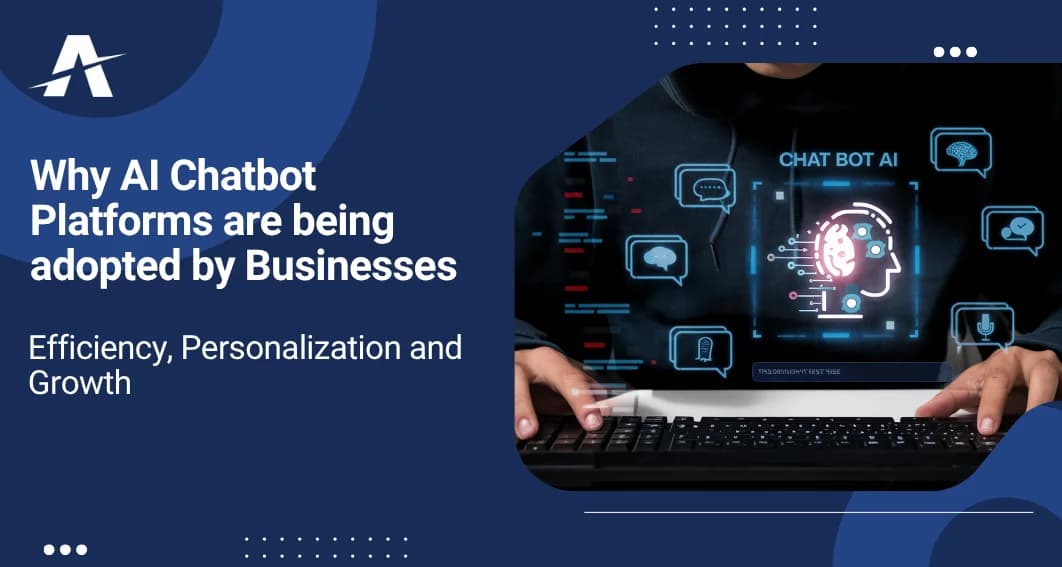AI chatbot platforms are increasingly adopted by businesses to enhance efficiency, deliver personalized customer experiences, and drive growth. By automating routine inquiries, they save time and reduce operational costs, allowing teams to focus on complex tasks. Advanced AI enables personalized interactions, improving customer satisfaction and loyalty.
Moreover, chatbots operate 24/7, ensuring constant support and faster responses. Their data-driven insights help optimize services, identify trends, and boost sales, making AI chatbots a vital tool for modern business success.
Evolution of AI Chatbot Platforms
Early chatbots were rule-based and limited to answering simple, pre-programmed questions. While helpful, they lacked the ability to adapt or understand complex human intent.
With advancements in natural language processing (NLP) and machine learning, AI chatbot platforms now:
- Understand context and sentiment in conversations
- Learn from interactions to improve responses over time
- Integrate seamlessly with CRM, ERP, and marketing systems
- Deliver voice, text, and even visual interactions
Efficiency Streamlining Business Operations
One of the most compelling reasons businesses adopt AI chatbot platforms is their ability to increase operational efficiency.
1. 24/7 Availability
Unlike human agents, chatbots don’t take breaks or holidays. They provide instant responses around the clock, ensuring customers always receive timely support.
2. Handling High Volumes of Requests
AI chatbots can manage thousands of conversations simultaneously, reducing wait times and freeing human agents to focus on high-priority issues.
3. Cost Reduction
By automating repetitive tasks such as FAQs, order tracking, or appointment scheduling, companies can significantly cut labor costs without sacrificing service quality.
4. Workflow Automation
Many platforms integrate with backend systems, enabling automated ticket creation, order processing, and follow-up emails, all without human intervention.
Personalization Building Stronger Customer Connections
In today’s market, personalization is a key differentiator, and AI chatbot platforms excel at delivering it.
1. Data-Driven Interactions
AI chatbots analyze customer behavior, purchase history, and browsing patterns to deliver tailored recommendations and solutions.
2. Adaptive Communication
With sentiment analysis, chatbots can adjust their tone and style based on a customer’s mood, offering empathy during complaints or enthusiasm during sales conversations.
3. Multilingual Capabilities
Serving a global audience becomes easier when chatbots can converse fluently in multiple languages and regional dialects.
4. Seamless Omnichannel Experience
AI chatbot platforms can maintain conversation history across web, mobile, and social channels, ensuring customers enjoy consistent and personalized experiences.
Growth Driving Sales and Market Expansion
Beyond customer service, AI chatbots play a direct role in driving business growth.
1. Lead Generation and Qualification
Chatbots can engage visitors on websites, capture their contact information, and qualify leads before passing them to sales teams.
2. Sales Assistance
By providing instant product recommendations, answering pre-purchase questions, and guiding customers through checkout, chatbots help boost conversion rates.
3. Upselling and Cross-Selling
AI-powered suggestions based on customer preferences can increase the average order value without feeling intrusive.
4. Market Expansion
Businesses can enter new regions faster with AI chatbots capable of engaging audiences in their local language and cultural style.
Real-World Applications Across Industries
E-commerce
Retailers use AI chatbots for product recommendations, order tracking, and customer support, reducing cart abandonment and improving customer loyalty.
Healthcare
Virtual health assistants help schedule appointments, provide preliminary symptom checks, and share relevant health resources.
Finance
Banks and fintech companies use chatbots for account inquiries, transaction updates, and financial advice while maintaining compliance.
Travel and Hospitality
Travel brands deploy chatbots for booking confirmations, itinerary changes, and destination recommendations.
Key Features to Look for in an AI Chatbot Platform
When selecting a chatbot platform, businesses should prioritize features that align with their needs:
- Natural Language Understanding (NLU) for better comprehension
- Integration capabilities with CRM, ERP, and marketing tools
- Customizable personality and tone to match the brand voice
- Analytics and reporting to measure engagement and performance
- Scalability to handle growth in traffic and use cases
Future of AI Chatbot Platforms
The next generation of AI chatbots will leverage generative AI and emotional intelligence to offer even more natural, human-like conversations. Future trends include:
- Voice-first interfaces for hands-free interaction
- Emotion detection to adapt responses in real time
- Augmented reality (AR) and virtual reality (VR) integration for immersive customer experiences
- Hyper-personalization using advanced predictive analytics
AI chatbot platforms are no longer optional—they’re essential for businesses looking to remain competitive in a fast-paced, customer-driven marketplace. By delivering efficiency, personalization, and growth opportunities, they help companies provide better customer experiences, reduce costs, and increase revenue.
Whether you’re a small business aiming to scale or a large enterprise seeking to optimize operations, AI chatbot platforms offer a powerful, adaptable solution to meet your needs today and in the future.
Frequently Asked Questions (FAQs)
Q1: Why are AI chatbot platforms important for businesses today?
They provide 24/7 customer service, streamline operations, personalize interactions, and help drive sales—all while reducing costs.
Q2: Can AI chatbots replace human agents completely?
Not entirely. They handle repetitive and high-volume tasks, while human agents focus on complex or sensitive interactions.
Q3: Are AI chatbot platforms expensive to implement?
Costs vary, but many solutions offer scalable pricing models suitable for businesses of all sizes.
Q4: How do AI chatbots improve personalization?
They analyze customer data, adapt tone, and deliver tailored recommendations for a more engaging experience.
Q5: Which industries benefit most from AI chatbot platforms?
E-commerce, healthcare, finance, travel, and education are among the top industries adopting chatbots for efficiency and growth.













